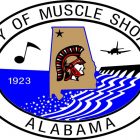Muscle Shoals Alabama
Muscle Shoals Alabama
Muscle Shoals Alabama is located in Northwest Alabama along the Tennessee River in a two county region known as the Shoals. Since the city of Muscle Shoals was founded in 1923, it has been recognized nationally for the Tennessee Valley Authority, and “Muscle Shoals music”. Today, Muscle Shoals is a thriving town in the heart of “The Shoals” and is known as a family-friendly place for our residents to live, work, and play.
Muscle Shoals Alabama History
Due to its strategic location along the Tennessee River, Muscle Shoals played a key role in historic land disputes between Native Americans and Anglo-American settlers in the late 1700s and early 1800s. It was also the site of an attempted community development project by Henry Ford in 1922.
The original streets of Muscle Shoals were named after streets in Detroit, Michigan due to Henry Ford’s influence in the area. Ford Motor Company operated a plant in the Listerhill community 3 miles east of Muscle Shoals for many years before closing in 1982. Just like Detroit, Woodward Avenue is the main road through the city. Henry Ford’s inability to acquire land from the Tennessee Valley Authority foiled his desire to create a 75-mile Industrial Megalopolis from Decatur to the Tri-State border of Pickwick Lake.
Muscle Shoals Alabama Native American Tribes
Muscle Shoals was a part of the Cherokee hunting grounds dating to at least the early eighteenth century, if not earlier. After the American Revolution, the Cherokees were divided over attitudes toward the new U.S. republic. An anti-American faction, dubbed the Chickamauga, separated from more conciliatory Cherokees, and moved into present-day south-central and southeastern Tennessee, most of them settling along the Chickamauga River. They claimed Muscle Shoals as part of their domain, and when Anglo-Americans attempted to settle the region in the 1780s and 1790s, the Chickamaugas bitterly resisted them. Upper Creeks, residing in what is now north and central Alabama, also resented any European or Euro-American presence in the region. A major incident occurred in 1790, when U.S. President George Washington sent an expedition under Major John Doughty in an attempt to establish a fort and trading post at Muscle Shoals. This expedition was nearly annihilated by a Chickamauga and Creek party sent to destroy it, and the project was abandoned by Doughty and the administration. 1
U.S. officials finally took control of the region in the wake of the U.S. invasion of Creek country during the War of 1812. Jackson and General John Coffee obtained cession of the land from both the Cherokee and Creek (who had continued to dispute possession) by treaty, without permission to do so from the federal government. Secretary of War William H. Crawford refused to recognize the cession, and reconfirmed Cherokee ownership, leading to personal enmity between him and Jackson, and causing a political struggle over the lands which Jackson and his backers eventually won. When Jackson, as President, implemented the policy of Indian Removal, Muscle Shoals was used as a site from which to ship Upper Creeks out to Oklahoma (then Indian Territory).1
Muscle Shoals Alabama Music
Since the 1960s, the city has been known for music – developing the “Muscle Shoals Sound”, as local recording studios (including FAME Studios in the late 1950s and Muscle Shoals Sound Studio in 1969) produced hit records that shaped the history of popular music.
Muscle Shoals is known for recording many hit songs from the 1960s to today at two studios: FAME Studios, founded by Rick Hall, where Arthur Alexander, Percy Sledge, Aretha Franklin, Wilson Pickett, Otis Redding and numerous others recorded; and Muscle Shoals Sound Studio, founded by the musicians known as The Swampers, which developed work for Bob Dylan, Paul Simon, the Rolling Stones and others. While the music from the area is often referred to as the “Muscle Shoals Sound“, all four of the Quad Cities have significantly contributed to the area’s musical history.
In addition to being home to country music band Shenandoah, a number of artists have visited Muscle Shoals to write and record. Both FAME Studios and Muscle Shoals Sound Studio are still in operation in the city. While famous for classic recordings from Rod Stewart, Aretha Franklin, Eric Clapton, Lynyrd Skynyrd, the Rolling Stones, and The Allman Brothers, recent hit songs such as “Before He Cheats” by Carrie Underwood and “I Loved Her First” by Heartland continue the city’s musical legacy. George Michael recorded an early, unreleased version of “Careless Whisper” with Jerry Wexler in Muscle Shoals in 1983. Bettye Lavette recorded her Grammy nominated album “Scene of the Crime” at FAME in 1972.
1 Wikipedia contributors, “Muscle Shoals, Alabama,” Wikipedia, The Free Encyclopedia, https://en.wikipedia.org/w/index.php?title=Muscle_Shoals,_Alabama&oldid=789832845 (accessed
).
